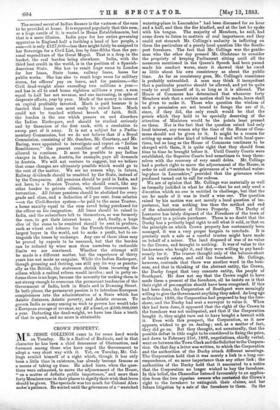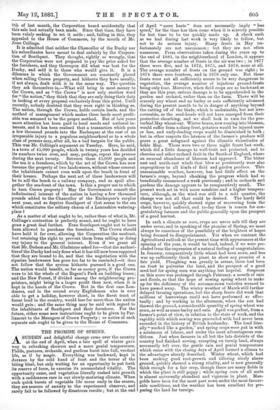CROWN PROPERTY.
MR. JESSE COLLINGS came in for some hard words on Tuesday. He is a Radical of Radicals, and in that character he has been a chief denouncer of Obstruction, and foremost among those who have urged the Government to adopt a very short way with it. Yet, on Tuesday, Mr. Col- lings availed himself of a right which, though it has only been a little time in existence, has already become famous as a means of taking up time. He asked leave, when the ques- tions were exhausted, to move the adjournment of the House, "on a matter of definite public importance," and more than fortylIembers rose in their places to signify their wish that leave should be given. The spectacle was too mach for Colonel Alex- ander's patience. He waited until the grievances of a "wretched watering-place in Lancashire" had been discussed for an hour and a half, and then the fire kindled, and at the last he spake with his tongue. The majority of Members, he said, had come down to listen to matters of real importance, and they could not stomach Mr. Collings's audacity in inflicting on them the particulars of a purely local question like the South- port foreshore. The fact that Mr. Collings was the gentle- man who the other day pressed Mr. Gladstone to consider the propriety of keeping Parliament sitting until all the measures mentioned in the Queen's Speech had been passed made his conduct worse, since it showed that he cared as little about his own consistency as about the public time. As far as consistency goes, Mr. Collings's conscience is probably untroubled. A man may think it inexpedient that a particular practice should be allowed, and yet be quite ready to avail himself of it, so long as it is allowed. The House of Commons has determined that whenever forty Members wish that a certain motion shall be made, leave shall be given to make it. Those who question the wisdom of such a permission are not bound to forego the use of it, since, if they did, the only result would be that the points which they hold to be specially deserving of the attention of Ministers would be the points least pressed on them. Nor is the fact that the question raised had only local interest, any reason why the time of the House of Com- mons should not be given to it. It might be a reason for setting up some other kind of tribunal to deal with local ques- tions, but so long as the House of Commons continues to be charged with them, it is quite right that they should from time to time be brought before it. Until County Courts were established, the Superior Courts had sometimes to busy them- selves with the recovery of very small debts. Mr. Collings had a perfect right to move the adjournment of the House, in order to call attention to the grievances of a "wretched water- ing-place in Lancashire," provided that the grievance when produced turned out to call for redress.
We are of opinion that Mr. Collings was materially as well as formally justified in what he did,—that he not only used a discretion which no one is entitled to challenge, but that the use he made of it was in itself a wise one. The question raised by his motion was not merely a local question of im- portance, but was nothing less than the method and end of the administration of Crown Property. The Duchy of Lancaster has lately disposed of the Foreshore of the town of Southport to a private purchaser. There is no doubt that the Duchy has a perfectly legal right to sell what it sold, or that on the principle on which Crown property has customarily been managed, it was a very proper bargain to conclude. It is precisely such a sale as a careful trustee might have made on behalf of a minor. The land disposed of was of no value to the Crown, and brought in nothing. It was of value to the landowners who bought it, and they were willing to pay hand- somely for it. The trustee thought only of the balance-sheet of his ward's estate, and sold the foreshore. Mr. Collings, however, contends that there was another ward in the busi- ness, and that in thinking of the abstract entity, the Crown, the Duchy forgot that very concrete entity, the people of Southport. He does not say that the Crown ought to have made them a present of the foreshore, all he insists on is that their right of pre-emption should have been recognised. If this had been done, the Corporation of Southport were seemingly willing to give the Government anything they asked. As long ago as October, 1880, the Corporation had proposed to buy the fore- shore, and the Duchy had sent a surveyor to value it. When this had been done, it appeared that the right of the Crown to the foreshore was not undisputed, and that if the Corporation bought it, they might tarn out to have bought a lawsuit with it. Even with this prospect, the Corporation, as it now appears, wished to go on dealing ; and, as a matter of fact, they did go on. But they thought, not unnaturally, that the possible defeat in title ought to be considered in fixing the price, and down to February 21st, 1882, negotiations, chiefly verbal, went on between the Town Clerk and the Solicitor to the Corpora- tion. On that day a letter was written, to which the Corporation and the authorities of the Duchy attach different meanings. The Corporation hold that it was merely a link in a long cor- respondence, of no more importance than any other link ; the authorities of the Duchy hold that it amounted to a notice that the Corporation no longer wished to buy the foreshore. In this belief, the Chancellor listened favourably to an applica- tion from the two riparian owners whooontestea the Crown's right to the foreshore to extinguish their claims, and bar fatale litigation by a sale of the foreshore to them. On the
9th of last month, the Corporation heard accidentally that this sale had actually been made. Since that time, they have been vainly seeking to set it aside ; and, failing in this, they appealed to the House of Commons, by the mouth of Mr. Jesse Collings. It is admitted that neither the Chancellor of the Duchy nor Ins subordinates have meant to deal unfairly by the Corpora- tion of Southport. They thought, rightly or wrongly, that the Corporation were not prepared to pay the price asked for the foreshore, and they thereupon did what was best for the Duchy, and sold it to those who would give it. It is a dilemma in which the Government are constantly placed when selling Crown property, and hitherto they have usually, if not always, dealt with it in the same way. The question they ask themselves is,—What will bring in most money to the Crown, and as "the Crown" is now only another word for "the nation," they think that they are only doing their duty in looking at every proposal exclusively from this point. Until recently, nobody doubted that they were right in thinking so. The nation, through the Crown, holds certain lands, and the method of management which makes these lands most profit- able was assumed to be the proper method. But of late years more attention has been paid to local needs and national in- terests, and it has been realised that a transaction which puts a few thousand pounds into the Exchequer at the cost of an irreparable injury to a populous neighbourhood or to a whole class of persons may, after all, be a bad bargain for the public. This was Mr. Collings's argument on Tuesday. Here, he said, is a town of 45,000 people, which in twenty years has doubled its numbers twice over, and may, perhaps, repeat the process during the next twenty. Between these 45,000 people and the sea is a foreshore, which by the act of the Crown has now become the property of two landowners, without whose consent the inhabitants cannot even walk upon the beach in front of their houses. Perhaps the next act of these landowners will be to sell the beach to a railway company, and so spoil alto- gether the sea-front of the town. Is this a proper use to which to turn Crown property ? May the Government consult the infinitesimal interest of the nation in having a few thousand pounds added to the Chancellor of the Exchequer's surplus next year, and so deprive Southport of that access to the sea which constitutes the solitary charm of a Lancashire watering- place As a matter of what ought to be, rather than of what is, Mr. Collings's contention is perfectly Bound, and he ought to have gone a great deal further. Even Southport ought not to have been allowed to purchase the foreshore. The Crown should have held it for ever, allowing the Corporation the usufruct, but retaining the right to prevent them from selling or doing any injury to the general interest. Even if we grant all that Mr. Dodson and Mr. Gladstone asked for—that the authori- ties of the Duchy had only done what it has till now been supposed that they are bound to do, and that the negotiation with the riparian landowners has gone too far to be rescinded—it does not follow that the system hitherto pursued is a good one. The nation would benefit, so far as money goes, if the Crown were to let the whole of the Regent's Park on building leases; and the New Forest, if divided among the neighbouring pro- prietors, might bring in a larger profit than now, when it is kept in the hands of the Crown. But in the first case Lon- doners, and in the second every Englishman who is ever able to get a holiday, however short, in the finest tract of forest land in the country, would lose far more than the nation would gin; and the same thing may be said with regard to the inhabitants of Southport and their foreshore. For the future, either some new instructions ought to be given by Par- liament to the Managers of Crown Property ; or notice of each separate sale ought to be given to the House of Commons.



































 Previous page
Previous page